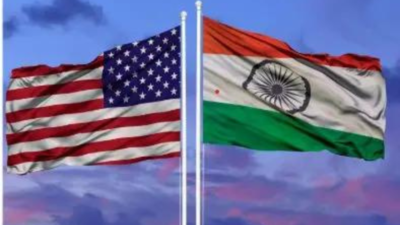India and the US have determined to carry sector-specific talks within the coming weeks to finalize the construction of the proposed bilateral commerce settlement (BTA).
This resolution comes after 4 days of discussions between senior officers from each nations, which concluded on Saturday. The talks happen within the context of the USA’s risk to impose reciprocal tariffs on key buying and selling companions, together with India, by April 2, in response to information company PTI.
The Ministry of Commerce acknowledged that these expert-level engagements will start nearly within the coming weeks, paving the way in which for an in-person negotiation spherical quickly after. Each side purpose to comprehend a mutually useful, multi-sector BTA, with the aim of finalizing its first tranche by fall 2025 (August-September).
The proposed settlement seeks to extend market entry for items, cut back tariff and non-tariff boundaries, and improve provide chain integration between the 2 nations.
A US delegation, led by Assistant US Commerce Consultant for South and Central Asia Brendan Lynch, visited India to finalize the phrases of the proposed pact, which goals to greater than double bilateral commerce to USD 500 billion by 2030. The 2 sides expressed their dedication to finalizing the BTA within the coming months, guaranteeing that the settlement aligns with shared objectives of prosperity, resilience, and mutual profit.
The discussions are a continuation of Commerce and Industries Minister Piyush Goyal’s go to to Washington from March 4-6, the place he met with US Commerce Consultant Jamieson Greer and Commerce Secretary Howard Lutnick. As well as, video conferences had been held between each events to observe up on the talks.
On Friday, US President Donald Trump referred to Prime Minister Narendra Modi as “a really sensible man” and emphasised that tariff talks would “work out very properly between India and our nation.” Trump’s remarks are important given his criticism of the excessive tariffs charged by India and different nations on American items. He has threatened to impose reciprocal tariffs on buying and selling companions, together with India, beginning on April 2.
In a commerce pact, two nations usually cut back or get rid of customs duties on most items traded between them, ease commerce norms for providers, and increase investments.
The US has demanded obligation concessions in sectors akin to industrial items, vehicles, wines, petrochemical merchandise, dairy, and sure agricultural objects like apples, tree nuts, and alfalfa hay. India is prone to concentrate on obligation cuts in labour-intensive sectors akin to textiles, though its negotiators are unlikely to incorporate dairy and agriculture in commerce discussions because of political sensitivity in India.
Indian exporters and trade teams have expressed concern that the USA’s reciprocal tariffs might hurt their pursuits, because the US is India’s largest buying and selling associate. There are additionally requires India to hunt exemptions from these tariffs to mitigate the potential influence.
India’s exports to the US embrace drug formulations, telecom devices, valuable stones, petroleum merchandise, and ready-made clothes. In the meantime, India’s principal imports from the US embrace crude oil, petroleum merchandise, coal, reduce and polished diamonds, plane, and equipment.
In 2023-24, the US was India’s largest buying and selling associate, with a complete bilateral commerce of USD 119.71 billion in items, together with USD 77.51 billion in exports and USD 42.19 billion in imports, leading to a commerce surplus of USD 35.31 billion. Moreover, the US has been a significant supply of overseas direct funding (FDI) for India, with USD 67.8 billion in investments acquired from the US between April 2000 and September 2024.
var _mfq = window._mfq || [];
_mfq.push([“setVariable”, “toi_titan”, window.location.href]);
!(function(f, b, e, v, n, t, s) {
function loadFBEvents(isFBCampaignActive) {
if (!isFBCampaignActive) {
return;
}
(function(f, b, e, v, n, t, s) {
if (f.fbq) return;
n = f.fbq = function() {
n.callMethod ? n.callMethod(…arguments) : n.queue.push(arguments);
};
if (!f._fbq) f._fbq = n;
n.push = n;
n.loaded = !0;
n.version = ‘2.0’;
n.queue = [];
t = b.createElement(e);
t.async = !0;
t.defer = !0;
t.src = v;
s = b.getElementsByTagName(e)[0];
s.parentNode.insertBefore(t, s);
})(f, b, e, ‘https://connect.facebook.net/en_US/fbevents.js’, n, t, s);
fbq(‘init’, ‘593671331875494’);
fbq(‘track’, ‘PageView’);
};
function loadGtagEvents(isGoogleCampaignActive) {
if (!isGoogleCampaignActive) {
return;
}
var id = document.getElementById(‘toi-plus-google-campaign’);
if (id) {
return;
}
(function(f, b, e, v, n, t, s) {
t = b.createElement(e);
t.async = !0;
t.defer = !0;
t.src = v;
t.id = ‘toi-plus-google-campaign’;
s = b.getElementsByTagName(e)[0];
s.parentNode.insertBefore(t, s);
})(f, b, e, ‘https://www.googletagmanager.com/gtag/js?id=AW-877820074’, n, t, s);
};
function loadSurvicateJs(allowedSurvicateSections = []){
const section = window.location.pathname.split(‘/’)[1]
const isHomePageAllowed = window.location.pathname === ‘/’ && allowedSurvicateSections.includes(‘homepage’)
if(allowedSurvicateSections.includes(section) || isHomePageAllowed){
(function(w) {
function setAttributes() {
var prime_user_status = window.isPrime ? ‘paid’ : ‘free’ ;
w._sva.setVisitorTraits({
toi_user_subscription_status : prime_user_status
});
}
if (w._sva && w._sva.setVisitorTraits) {
setAttributes();
} else {
w.addEventListener(“SurvicateReady”, setAttributes);
}
var s = document.createElement(‘script’);
s.src=”https://survey.survicate.com/workspaces/0be6ae9845d14a7c8ff08a7a00bd9b21/web_surveys.js”;
s.async = true;
var e = document.getElementsByTagName(‘script’)[0];
e.parentNode.insertBefore(s, e);
})(window);
}
}
window.TimesApps = window.TimesApps || {};
var TimesApps = window.TimesApps;
TimesApps.toiPlusEvents = function(config) {
var isConfigAvailable = “toiplus_site_settings” in f && “isFBCampaignActive” in f.toiplus_site_settings && “isGoogleCampaignActive” in f.toiplus_site_settings;
var isPrimeUser = window.isPrime;
var isPrimeUserLayout = window.isPrimeUserLayout;
if (isConfigAvailable && !isPrimeUser) {
loadGtagEvents(f.toiplus_site_settings.isGoogleCampaignActive);
loadFBEvents(f.toiplus_site_settings.isFBCampaignActive);
loadSurvicateJs(f.toiplus_site_settings.allowedSurvicateSections);
} else {
var JarvisUrl=”https://jarvis.indiatimes.com/v1/feeds/toi_plus/site_settings/643526e21443833f0c454615?db_env=published”;
window.getFromClient(JarvisUrl, function(config){
if (config) {
const allowedSectionSuricate = (isPrimeUserLayout) ? config?.allowedSurvicatePrimeSections : config?.allowedSurvicateSections
loadGtagEvents(config?.isGoogleCampaignActive);
loadFBEvents(config?.isFBCampaignActive);
loadSurvicateJs(allowedSectionSuricate);
}
})
}
};
})(
window,
document,
‘script’,
);

